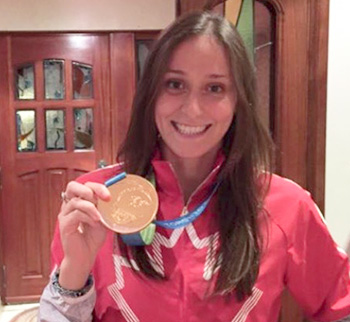Four Canadian Jewish athletes are making room in their trophy cases for medals they earned at the recently concluded Toronto 2015 Pan Am Games.
Synchronized swimmer Lisa Mikelberg of Montreal brought home a gold medal in team competition, while Toronto runner Sasha Gollish captured a bronze in the 1,500-metre race. Rhythmic gymastics twin duo Anjelika and Victoria Reznik received bronze medals in the ribbons group and as well in the clubs/hoops group. **
Canada’s beach volleyball team of Josh Binstock and Sam Schachter, who are ranked 13th in the world by FIVB, the sport’s governing body, were eliminated in the quarter-finals and finished out of the medals.
Mikelberg, however, was revelling in the aftermath of her Pan Am Games triumph, including the march-in to the stadium as part of the opening ceremonies.
“It was an incredible experience,” she said on the phone from Montreal. “Being able to be in your home country and win gold in front of family and friends who supported me so much, it was a dream come true.”
Mikelberg was part of a team of eight young women who wowed the judges with their performance. Although they were favourites going in, the women still had to perform in the pool.
Mikelberg said their winning formula included “small patterns, good synchronization, quick movements and using the music real well.”
The highlights also included very acrobatic movements, she said.
Employing techniques drawn from the world of gymnastics and somewhat resembling an in-the-pool version of cheerleading acrobatics, Mikelberg was the swimmer being flung out of the water and performing twists and turns in the air.
For Mikelberg, doing in-water gymnastics was a natural progression.
“I actually started in gymnastics really young, and I love the sport,” she said.
A fall at a young age scared her away from gymnastics, and a friend suggested she try the pool instead. Already a decent swimmer, she immediately took to the sport, and clearly became a great swimmer.
What people don’t realize, she explained, is that when the swimmers have their feet in the air, they’re not touching the bottom. Similarly when they are performing their co-ordinated movements, they’re egg-beating like mad to look like they’re standing perfectly still.
It takes a lot of effort, training, practice and fitness to perform at a gold-medal level, and Mikelberg’s exercise regimen is impressive, if not exhausting.
In the months before the games, she and the other swimmers prepare six days a week, from 7 a.m. to noon and from 2:30 to 6 p.m.
To make the time, she put her studies in sociology on hold, though she intends to resume them on route to a degree in education. When she’s done with her competitive career, the 25-year-old plans to go into education as a step toward a career in teaching.
In the meantime, Mikelberg is back at home, letting a neck injury heal.
Even before the games officially ended, Mikelberg and the rest of the national swim team travelled to Slovakia for another competition. And there’s one in Kazan, Russia, right after that.
Unfortunately she aggravated a nagging injury, and with her neck spasming, she was sent home to rest.
But she’s already got her late summer and fall planned. There are national trials in September and then there are qualifiers in March in advance of next summer’s Olympics.
Meanwhile, Gollish, 33, has a bronze medal to add to her collection. Gollish ran the final race in 4:10.11, behind teammate Nicole Sifuentes, who won the silver, and gold medalist Muriel Coneo of Colombia, who won with a time of 4:09.05.
What makes her third-place finish remarkable is that her left shoe was knocked half off 150 metres into the race.
Gollish is one of Canada’s best track athletes. She was named 2015 Canadian Inter-University Sport (CIS) track athlete of the year and two summers ago in Israel, she won the gold medal in the Maccabi Woman Event, which combined competitions in cycling, swimming and running.
Besides, their bronze medal performances, the Reznik sisters finished fifth in group all-round in rhythmic gymnastics.
And in beach volleyball, Binstock and Schachter, came out of the gate fast before falling in the quarter-finals. In their first game, they defeated Nicaragua 2 sets to 1, then went on to beat Guatemala 2-0.
Uruguay likewise fell to the Canadians, 2-0, setting up a quarter-final match-up versus Mexico.
Binstock and Schachter lost both sets by narrow scores of 21-19 and 26-24
** This article was modified from its original form to include Anjelika and Victoria Reznik among the medal winners.
